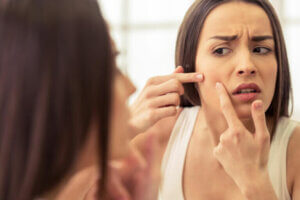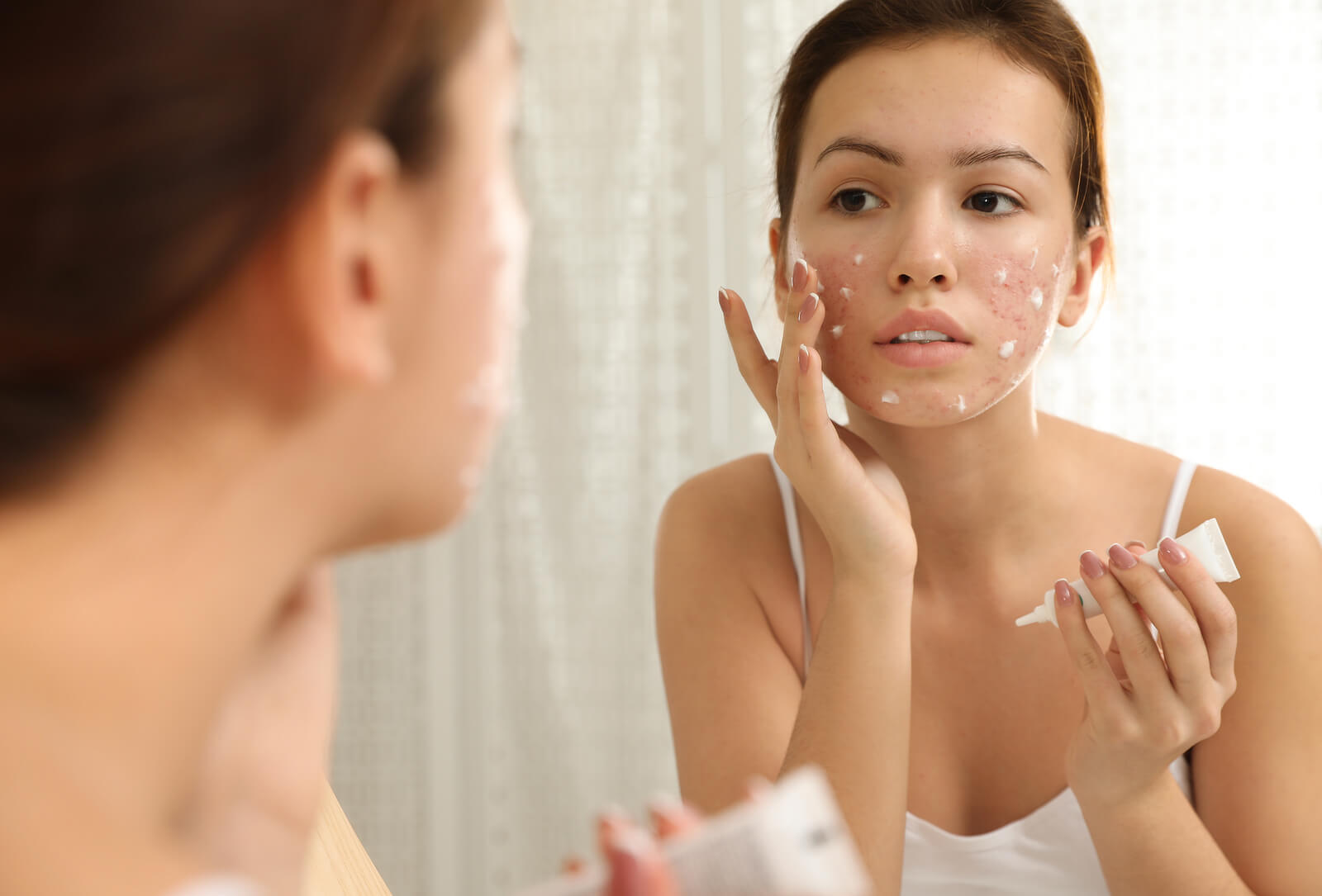What Is Mild Acne and How Is It Treated?

Mild acne is on the list of cosmetic problems for most of the world’s population. This is because many people, at some point in their life, can develop it in the form of pimples (open or closed) and papules on the upper part of the trunk, but especially on the face.
For the treatment of mild acne, there are a wide variety of over-the-counter products that can be used. But in order for these to be effective, it’s important to know a little more about their composition.
Along with the use of a good facial cleanser, it’s important to take into account other measures that, although very simple, can contribute greatly to the health of the skin. We’ll delve deeper into this below.
What is mild acne?

As indicated in the MSD Manual, acne can be classified as mild, moderate, or severe, depending on the type of lesions it causes and the number of them. Fortunately, they’re all treatable.
Often, people who’ve already passed adolescence are distressed when they see that their skin has blemishes and unconsciously oversize their situation. For this reason, until they have a check-up with the dermatologist, they’re unaware that, although they believed that their acne was moderate or severe, it was actually mild.
Mild acne is characterized by causing few lesions on the skin. These usually develop in the form of “a few non-inflamed white or blackheads or a moderate number of mildly irritated bumps.” It can also be said that these are superficial lesions, which don’t significantly affect the deeper layers of the skin.
Occasionally, pustules may appear that cause the surrounding skin to take on a reddish tone, but this isn’t the most situation. Breakouts usually subside in a short time and don’t leave deep scars.
Like other forms of acne, it can affect the face, ears, neck, part of the chest, shoulders, and back.
How do you know if your acne is mild?
If you have acne, but you’re not sure if it’s mild or moderate, the best thing you can do is see a dermatologist. Once there, the professional will conduct an evaluation and tell you what you have and what the most appropriate treatment is for you to have healthy skin.
If you’ve already booked a consultation with a dermatologist, but are curious and want to confirm or rule out whether your case is mild acne, you can also examine yourself at home taking into account the following:
- You have white or black spots, but these are usually not inflamed.
- When you have pimples, they don’t tend to become very inflamed and are rare.
- The outbreaks subside in a short time and don’t leave significant scars.
It should be noted that a home examination isn’t a substitute for a medical consultation. At the same time, pharmacists can provide some guidance when purchasing cleaning and skin care products, but can’t diagnose any conditions. So, be sure to discuss all your concerns with a dermatological specialist.
How to treat mild acne?

It’s important to treat mild acne properly to prevent it from becoming a bigger problem. However, it’s common for many people to simply buy anti-acne products and wait for results, especially teenagers and people under 30 years of age. This is because they believe that acne, being mild, will subside on its own and won’t worsen.
While it’s not wrong to use products specially designed for skin with acne, it’s important to know how to choose them and combine them with some basic self-care. It also doesn’t hurt to consult a specialist in order to learn more about the condition of the skin, what measures to take, what not to do, etc.
Experts note the following in regard to acne treatment:
“In general, a gradual and progressive treatment is recommended, with the first option for mild cases being topical treatment (alone or combined), second, the association of topical drugs with oral antibiotics, and, finally, systemic retinoids (isotretinoin oral) or oral contraceptives (in women)”.
The best anti-acne products
Some of the over-the-counter products you can opt for are those that contain salicylic acid, benzoyl peroxide, or Differin.
Read the instructions for each product carefully, be consistent and organized in your application, and make sure to use a daily sunscreen that’s consistent with your skin type. This is because many anti-acne products cause photosensitivity.
Many cleansers have exfoliating particles that help remove impurities and keep skin clean and balanced (in terms of hydration and moisture). For this reason, they shouldn’t be combined daily with other exfoliating products (unless indicated by the dermatologist), as this could be too aggressive for the skin.
In short, if you have doubts about how to take care of your skin, even when you have mild acne, the best thing you can do is consult with your doctor and follow their recommendations.
Mild acne is on the list of cosmetic problems for most of the world’s population. This is because many people, at some point in their life, can develop it in the form of pimples (open or closed) and papules on the upper part of the trunk, but especially on the face.
For the treatment of mild acne, there are a wide variety of over-the-counter products that can be used. But in order for these to be effective, it’s important to know a little more about their composition.
Along with the use of a good facial cleanser, it’s important to take into account other measures that, although very simple, can contribute greatly to the health of the skin. We’ll delve deeper into this below.
What is mild acne?

As indicated in the MSD Manual, acne can be classified as mild, moderate, or severe, depending on the type of lesions it causes and the number of them. Fortunately, they’re all treatable.
Often, people who’ve already passed adolescence are distressed when they see that their skin has blemishes and unconsciously oversize their situation. For this reason, until they have a check-up with the dermatologist, they’re unaware that, although they believed that their acne was moderate or severe, it was actually mild.
Mild acne is characterized by causing few lesions on the skin. These usually develop in the form of “a few non-inflamed white or blackheads or a moderate number of mildly irritated bumps.” It can also be said that these are superficial lesions, which don’t significantly affect the deeper layers of the skin.
Occasionally, pustules may appear that cause the surrounding skin to take on a reddish tone, but this isn’t the most situation. Breakouts usually subside in a short time and don’t leave deep scars.
Like other forms of acne, it can affect the face, ears, neck, part of the chest, shoulders, and back.
How do you know if your acne is mild?
If you have acne, but you’re not sure if it’s mild or moderate, the best thing you can do is see a dermatologist. Once there, the professional will conduct an evaluation and tell you what you have and what the most appropriate treatment is for you to have healthy skin.
If you’ve already booked a consultation with a dermatologist, but are curious and want to confirm or rule out whether your case is mild acne, you can also examine yourself at home taking into account the following:
- You have white or black spots, but these are usually not inflamed.
- When you have pimples, they don’t tend to become very inflamed and are rare.
- The outbreaks subside in a short time and don’t leave significant scars.
It should be noted that a home examination isn’t a substitute for a medical consultation. At the same time, pharmacists can provide some guidance when purchasing cleaning and skin care products, but can’t diagnose any conditions. So, be sure to discuss all your concerns with a dermatological specialist.
How to treat mild acne?

It’s important to treat mild acne properly to prevent it from becoming a bigger problem. However, it’s common for many people to simply buy anti-acne products and wait for results, especially teenagers and people under 30 years of age. This is because they believe that acne, being mild, will subside on its own and won’t worsen.
While it’s not wrong to use products specially designed for skin with acne, it’s important to know how to choose them and combine them with some basic self-care. It also doesn’t hurt to consult a specialist in order to learn more about the condition of the skin, what measures to take, what not to do, etc.
Experts note the following in regard to acne treatment:
“In general, a gradual and progressive treatment is recommended, with the first option for mild cases being topical treatment (alone or combined), second, the association of topical drugs with oral antibiotics, and, finally, systemic retinoids (isotretinoin oral) or oral contraceptives (in women)”.
The best anti-acne products
Some of the over-the-counter products you can opt for are those that contain salicylic acid, benzoyl peroxide, or Differin.
Read the instructions for each product carefully, be consistent and organized in your application, and make sure to use a daily sunscreen that’s consistent with your skin type. This is because many anti-acne products cause photosensitivity.
Many cleansers have exfoliating particles that help remove impurities and keep skin clean and balanced (in terms of hydration and moisture). For this reason, they shouldn’t be combined daily with other exfoliating products (unless indicated by the dermatologist), as this could be too aggressive for the skin.
In short, if you have doubts about how to take care of your skin, even when you have mild acne, the best thing you can do is consult with your doctor and follow their recommendations.
-
Guerra Tapia, Aurora, Raúl de Lucas Laguna, José Carlos Moreno Giménez, Montserrat Pérez López, Ii Miquel Ribera Pibernat, Elena Martínez Prats, Rosa Senan Sanz, José Casas Rivero, and Universitario La Paz Madrid. 2015. “Consensus in the Topical Treatment of Acne.” Med Cutan Iber Lat Am. Vol. 43. www.medigraphic.com/medicinacutaneawww.medigraphic.org.mxwww.medigraphic.org.mx.
-
Keri, Jonette E. n.d. “Acné – Trastornos de La Piel – Manual MSD Versión Para Público General.” Manual MSD- Versión Para Público General. Accessed June 1, 2021. https://www.msdmanuals.com/es/hogar/trastornos-de-la-piel/acné-y-trastornos-relacionados/acné.
-
Varios. 2019. “Tratamiento Del Acné.” Boletín Terapéutico Andaluz 34 (4): 38–48.
-
Zaenglein, Andrea L., Arun L. Pathy, Bethanee J. Schlosser, Ali Alikhan, Hilary E. Baldwin, Diane S. Berson, Whitney P. Bowe, et al. 2016. “Guidelines of Care for the Management of Acne Vulgaris.” Journal of the American Academy of Dermatology 74 (5): 945-973.e33. https://doi.org/10.1016/j.jaad.2015.12.037.
Este texto se ofrece únicamente con propósitos informativos y no reemplaza la consulta con un profesional. Ante dudas, consulta a tu especialista.







